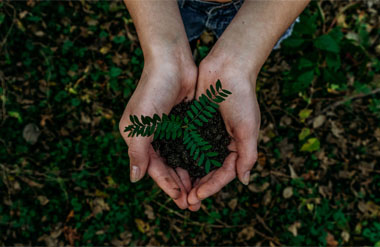Five tips to go green at home

In honor of Earth Day Friday, April 22nd, I wanted to share five practical tips that can make a meaningful impact on your environmental footprint. My family and I take many small steps to reduce our environmental impact as opposed to focusing on one big thing. There are hundreds and hundreds of little things that you can do on a daily basis that will reduce your impact. These are a few simple ones that I hope guide you to the path of becoming greener. If you are inspired, check out these more substantial reviews for more ideas of things you can do.
Turn your heat down. We try to keep the temperature at 67 degrees in my house. That’s relatively comfortable for my son and me, but a constant battle with Jacque because she runs colder than we do. She ends up wearing sweaters and barricading herself in her office where she can more easily control the heat. However, reducing the temperature not only saves money but also your consumption of electricity, wood, or natural gas, depending on your heat source.
Reduce, reuse, recycle (and compost). Yes, you have been hearing about this for years. That’s because it can be incredibly impactful. Reducing your consumption not only saves money but it means fewer new products need to be manufactured, reducing the amount of raw materials needed to develop those products. If you already have a product and no longer need it, but it is in usable condition, consider giving it away. I find anything listed for free on NextDoor or Craigslist get picked up almost immediately. If the product is no longer in usable condition, consider how you might repurpose (old socks become rags, egg cartons become seed starters). Finally, if possible try to purchase items that are recyclable and make sure to recycle them.
Replace and turn off your lights. Incandescent lights consume a surprising amount of energy. As they burn out, replace them with LED lights, which last longer, stay cooler, and consume less energy. Whether you are using LED lights or not, keeping the lights off in unused rooms conserves energy.
Conserve water. We are fortunate to live in the Pacific Northwest where water is not yet a problem. But, as the climate changes it will become more of an issue. Conserve water where you can, turning off the tap while you brush your teeth or wash the dishes. Don’t overwater your lawn during the hot season.
Reduce your use of plastics. There seems to be a war on plastic bags in the region. That’s because they are terrible for the environment – it takes petroleum to make them (8-10% of America’s overall oil supply goes to making plastic) and they foul the environment when they are discarded, taking decades to breakdown. Further, there are studies that show reheating food in plastic containers causes chemicals to leach into your food. We switched to glass storage containers at our house to avoid this problem. These are just a few simple methods to reduce your impact on the environment. They may or may not work for you and whether or not you choose to pursue them, I encourage you to think about how you are impacting the environment in make changes to reduce your footprint.
